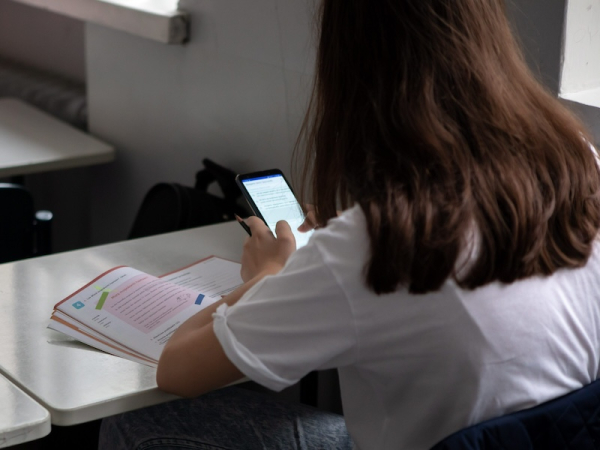
A student on her phone in a classroom. Photo: Lehtikuva
- Next Article Orpo urges tougher Western response to Russia
Finnish parents are delaying smartphone purchases for children starting school, according to new data from mobile operators and research institutions.
A shift in public attitude has seen fewer families providing devices to children under the age of nine. Operators DNA and Elisa both reported steep declines in the number of smartphones being purchased for first-graders.
DNA said only 36 percent of children turning seven now receive a smartphone, compared to over 70 percent one year earlier. The figures include smartphones, basic phones, and wearable communication devices.
Jussi Mälkiä, Brand Director at DNA, said the new trend reflects growing awareness.
“There’s not necessarily any need to buy a device for a child starting school,” Mälkiä said.
Laura Puusaari, Business Director at Elisa, said their latest customer survey found that most parents now view age nine as the appropriate time for a first smartphone.
“We now have a better understanding of the risks children face in open internet environments and on various social media apps,” Puusaari said.
Both companies now advise against smartphones for younger children, and note that some families are waiting until children are 11 before introducing them to personal digital devices.
The new advice marks a contrast with earlier years, when parents were more eager to give young children smartphones to help them build digital skills.
Silja Martikainen, Associate Professor of Developmental and Educational Psychology at the University of Helsinki, said the shift is supported by research.
“It’s great to see growing awareness of research on how excessive screen time affects young children’s development and wellbeing,” Martikainen said.
She cited links between prolonged digital device use and lower academic performance, poorer mental health, and reduced physical activity in children.
A report from the Mannerheim League for Child Welfare also identified growing concern about youth screen use. It found that two out of five young people in Finland now spend more than four hours daily on their phones.
Cyberbullying was also reported to be worsening.
The findings come after the Finnish Parliament passed legislation allowing schools to ban mobile phones on campus. The bill grants individual institutions the authority to limit device use during school hours.
Schools are expected to implement rules by the start of the next academic year.
Elisa and DNA said they are now adjusting their business models to reflect changing customer expectations.
Mälkiä said staff are trained to advise parents on device options, including communication-only wearables such as smartwatches.
“If a parent is determined to buy a device, we explain the pros and cons. The decision is theirs, but we want to provide information and give our perspective,” Mälkiä said.
According to Elisa, nearly half of all first-grade children in Finland are expected to begin school this autumn with a smartwatch instead of a smartphone.
The watches provide basic calling and messaging functions, allowing families to maintain contact without enabling broader internet access.
Martikainen said technology bans and device restrictions are not enough on their own.
“The real problem isn’t the devices, but the gap between children and adults,” she said.
She warned that strict policies often result in confrontation. Instead, she called for more active engagement from parents.
Martikainen advised parents to show interest in how children use their devices, including who they interact with online.
She said phones can serve positive purposes when used with support and supervision.
“Instead of just setting limits, we should think about how to keep the conversation open with our children and teenagers,” Martikainen said.
While commercial providers and health experts share concerns over early smartphone use, both camps agree that technology will remain part of children’s lives.
DNA and Elisa said their future guidance will continue to evolve based on customer feedback and new data on child development.
HT
- Next Article Orpo urges tougher Western response to Russia
Source: www.helsinkitimes.fi
